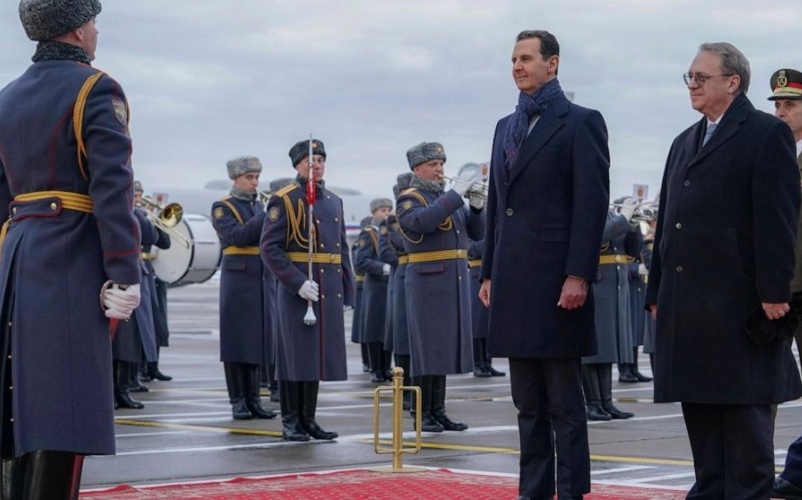Bashar Assad and Russia’s Deputy Mikhail Bogdanov at a welcome ceremony at Vnukovo airport, Moscow, Russia, March 14, 2023
UPDATE, MAR 19:
Bashar al-Assad is in the UAE for an official visit.
The trip has more ceremony than Assad’s visit to the UAE last year, his first journey to an Arab state since the Syrian uprising in March 2011.
The UAE backed anti-Assad factions, but like some Arab states, has moved to normalize relations with the Syrian regime.
Assad was met by President Sheikh Mohammed bin Zayed al-Nahyan on arrival in Abu Dhabi. His plane was met by Emirati fighter jets, and there was a cannon salute as his convoy entered the royal palace.
“We held constructive talks aimed at developing relations between our two countries,” Sheikh Mohammed tweeted. “Our discussions also explored ways of enhancing cooperation to accelerate stability and progress in Syria and the region.”
UPDATE, MAR 17:
The PR value of Bashar al-Assad’s appearance with Vladimir Putin in Moscow has crumbled over a dispute about the Turkish presence in Syria.
The two-day Moscow meeting of deputy foreign ministers from the Assad regime, Russia, Iran, and Turkey was cancelled on Thursday.
The discussion was to prepare for a meeting of Foreign Ministers, after the Assad regime and Turkish Defense Ministers met in December for the first time since the Syrian uprising began in March 2011.
An announcement cited “technical reasons”, but Assad tipped off the real reason in interviews with Russian State outlets after his Wednesday photo opportunity with Putin.
With regards to a meeting with [Turkish President Recep Tayyip] Erdoğan, it’s tied to us reaching a stage where Turkey is clearly and unambiguously ready for the full withdrawal of the Turkish military from the territory of Syria — for the cessation of supporting terrorism and restoration of the situation to the state it was before the start of the war in Syria.
This is the only situation when it would then be possible to have a meeting between me and Erdoğan. Aside from that, what’s the value of such a meeting and why would we do it if it would not achieve final results for the war in Syria?
The Turkish military initially intervened in Syria in August 2016, moving across the border to push back the Islamic State and to take Kurdish-controlled territory in the northwest. Ankara sent more troops into northeast Syria in December 2018 to occupy more Kurdish areas.
In January, Erdoğan — who is campaigning for re-election in May — raised the possibility of a joint meeting with Assad and Putin.
UPDATE, MAR 16:
Bashar al-Assad has pledged loyalty to the Kremlin’s positions during his visit to Moscow.
While no details of his talks with Vladimir Putin have been given, Assad told Russia State media that he welcomes any expansion of Moscow’s military bases in Syria.
“We think that expanding the Russian presence in Syria is a good thing,” he said. “Russia’s military presence in any country should not be based on anything temporary.”
ORIGINAL ENTRY: Syria’s Bashar al-Assad is visiting his essential backer, Vladimir Putin, in Moscow.
Assad and a ministerial delegation arrived in the Russian capital on Tuesday.
A Kremlin statement said Putin and Assad will discuss cooperation in political, trade, and humanitarian spheres “as well as prospects for an overall settlement of the situation in and around Syria”.
The Kremlin gave no details of such a settlement. The Assad regime’s 12-year campaign to break the Syrian uprising for rights and justice has frozen in the fragmentation of the country: the regime areas, the opposition-held northwest, and the Kurdish-controlled northeast.
From the start of the uprising in March 2011, the Kremlin provided logistical, intelligence, and propaganda support to the regime. In 2015, with Assad on the verge of falling from power and his military close to breaking point, Moscow’s military intervention turned the course of the conflict.
Assad last visited Moscow in September 2021, five months before Putin’s invasion of Ukraine.

